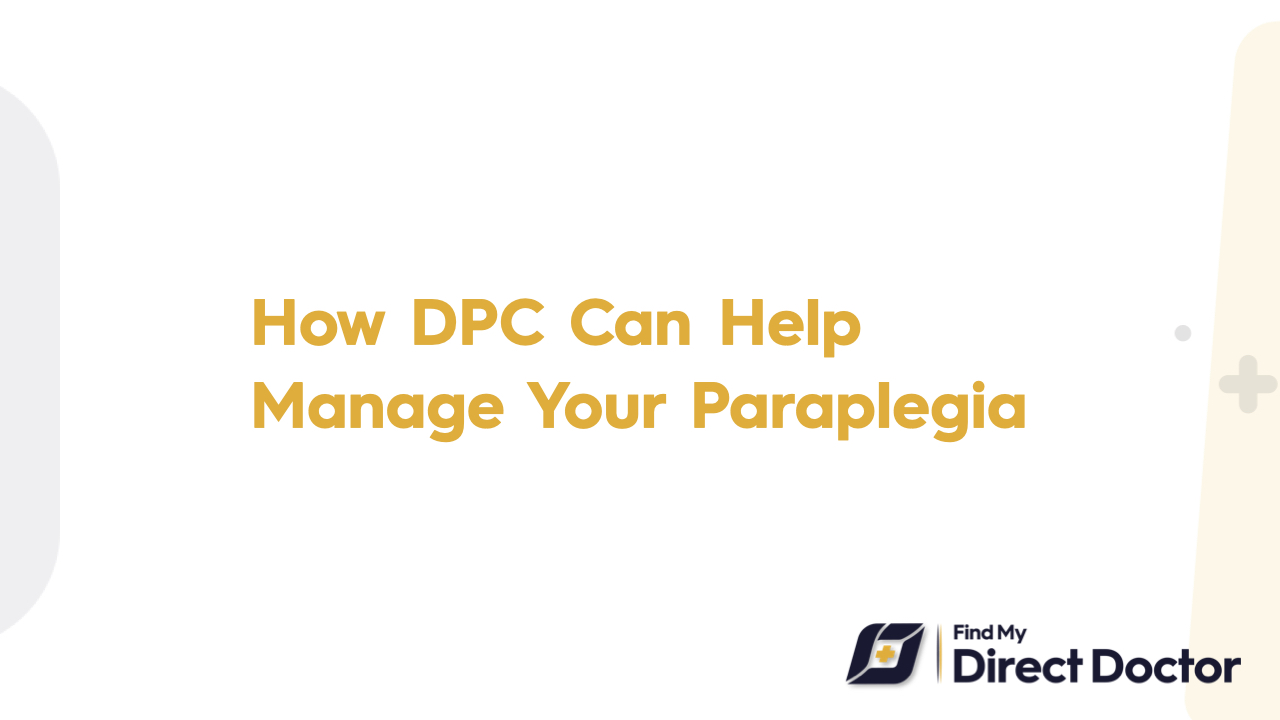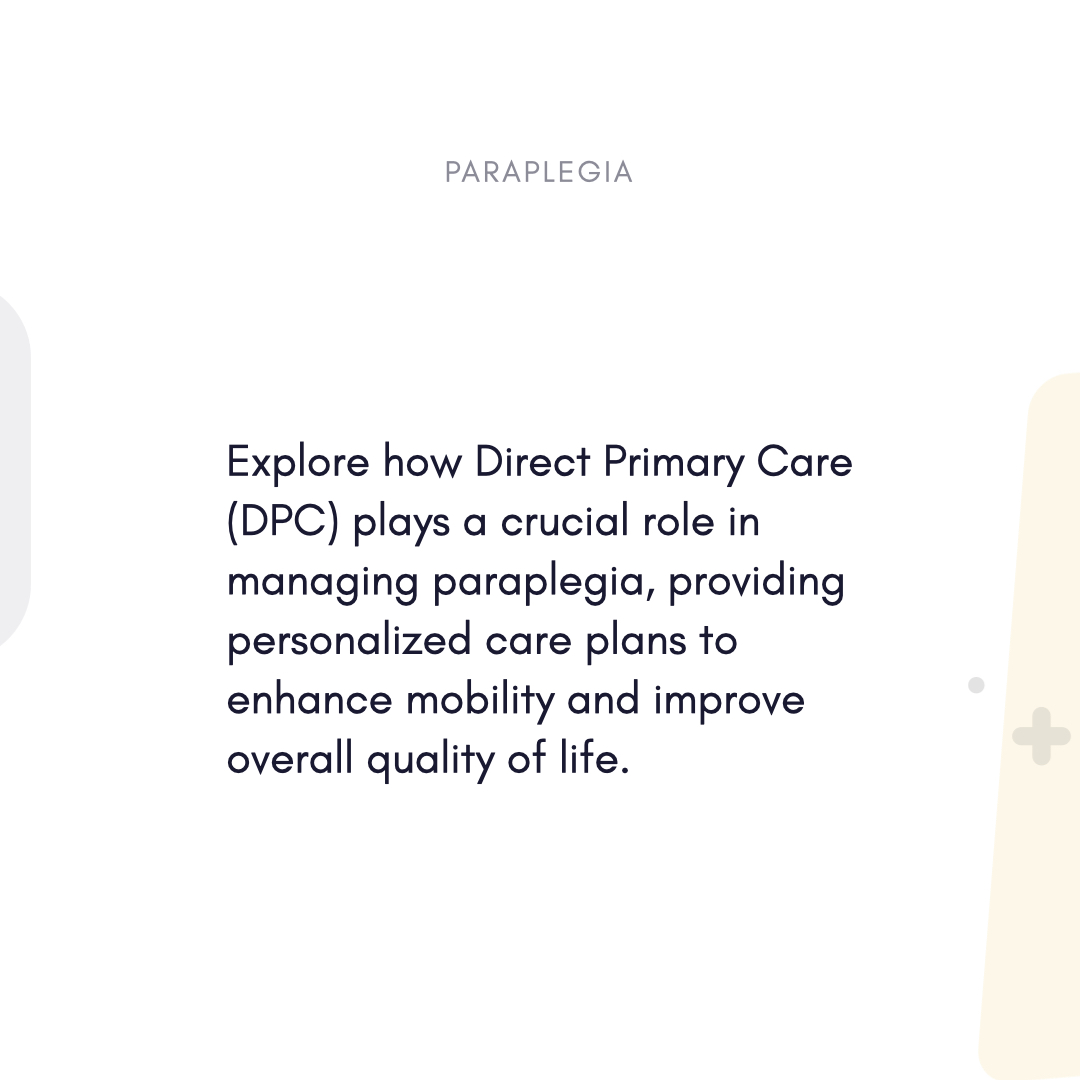Paraplegia and Direct Primary Care (DPC): Personalized Care for Independence and Wellness
Daily recalibration is life following a spinal cord injury. From controlling neurogenic bladder to preventing pressure ulcers, almost 300,000 Americans with paraplegia negotiate a complex web of chronic medical problems. Delayed appointments, poor communication, and revolving-door ER visits characterize traditional care that falls short. Still, there is hope since Direct Primary Care (DPC) provides a lifeline of proactive, patient-centered help to recover control.

Comprehending Paraplegia
Underlying conditions like multiple sclerosis or spinal cord injuries (SCI), paraplegia causes loss of motor/sensory ability below the waist. Important obstacles consist:
- Neurogenic bladder/bowel: Incontinence risk, infections.
- Painful muscle stiffness or spasms define spasticity.
- Pressure injuries: Ulcers from extended immobility.
- Life-threatening blood pressure surges known as autonomic dysreflexia.
The American Spinal Injury Association (ASIA) emphasizes that maximum independence and avoidance of complications depend on thorough, ongoing treatment.
DPC Revolutionizes Paragraphia Management
Operating on a membership model usually 50–150 USD/month, Direct Primary Care (DPC) provides unlimited access to your physician for a set fee. For paraplegics, this means no insurance hassles, no co-pays, and a care plan tailored to your needs.
1. Active Surveillance and Quick Reaction
The easily available DPC model guarantees:
- Same-day evaluations for skin redness or urinary tract infections (UTIs).
- Negotiated cash prices for bladder scans, bloodwork, or imaging make diagnostics reasonably affordable.
- Regular skin checks, bowel management programs, and vaccinations—e.g., pneumococcal—have preventive focus.
2. Customized, Guideline-Driven Treatment
Using ASIA guidelines, DPC doctors design customized plans including:
- Customized regimens including Botox, tizanidine, or baclofen help with spasticity control.
- Dietary fiber plans, anticholinergics, or intermittent catheterization schedules—bladder or bowel protocols—are options.
- Mental health integration: SCI-related depression or anxiety counseling
3. Complete, Economical Support
DPC lessens financial pressure by:
- Medication costs: Wholesale pricing for laxatives, catheters, or gabapentin.
- 24/7 telehealth support for autonomic dysreflexia alerts or UTI symptoms helps prevent ER visits.
- Discounted cash rates for occupational/physical therapy coordinate therapy.
DPC's Advantages for Paraplegia Patients
1. Unmatched Approachability
- 24/7 text/phone provider access for dysreflexia and other urgent issues.
- No waiting for specialist referrals to wound care facilities or urologists.
2. Constant of Treatment
- From bowel patterns to skin integrity, one committed doctor logs your whole health history.
- Reminders for pressure release adjustments, bowel routines, or equipment checks form preventive alerts.
3. Open Affordability
- By avoiding ER visits, hospitalizations, and co-pay stacks, typical savings are 3,000+ USD annually.
- Membership consists in consultations, care coordination, and management of chronic diseases.
Personal Success Stories from Real Life
- Marcus, 34, with T6 paraplegia, experienced repeated urinary tract infections and ER visits. His DPC doctor arranged discounted urodynamic testing, taught advanced catheter techniques, and prescribed preventative antibiotics. For twelve months he is now infection-free.
- Case 2: 48-year-old Lena battled spasticity-induced sleep deprivation. Her DPC provider connected her with a massage therapist, recommended a baclofen pump trial, and changed her seated cushion. Her spasms dropped by seventy percent, allowing peaceful sleep.
Typical Questions: Paraplegia and DPC
- Can DPC manage crises including autonomic dysreflexia?
- A: Surely. DPC doctors coordinate ER transfers if necessary and offer quick direction on lower blood pressure (e.g., sitting straight, nitropaste).
- For lifetime paraplegia care, is DPC reasonably priced?
- A: Right away. Members save money on catheters, wound supplies, and specialist visits—money better used for home modifications or adaptive equipment.
- What would happen if I needed a neurologist or wheelchair specialist?
- A: DPC doctor coordinates fast-tracking visits and self-pay discounts by working with top local experts.
DPC Is a Win for Paraplegia Patients: Why
Emphasizing their alignment with ASIA guidelines, the American Academy of Family Physicians supports DPC.
- Reducing hospitalizations by means of proactive UTI/pressure injury prevention.
- Tools for tracking symptoms, modifying practices, and advocating adaptive technology help empower you.
- Trust: Personal, episodic treatment is replaced by a lifetime patient-doctor relationship.
Get Back Independence Confidently
Paraplegia does not imply reliance. DPC helps you find a partner who expects challenges, organizes effortlessly, and enables you to flourish—on your terms.






